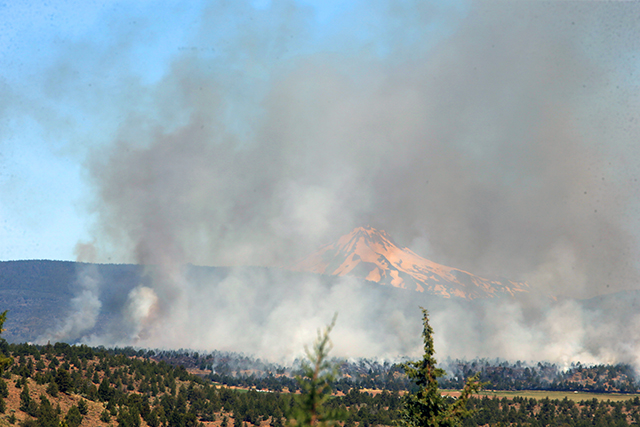Frequently asked questions of an anosmiac
Published 12:00 am Monday, May 9, 2016

- Stinky socks don’t faze Krueger, either. As a kid, she’d trick her brother’s baseball teammates out of money by betting them she could sniff their smelly socks without reacting to the stench.
I was one move away from cooking spoiled pork for a friend. It would have been the second time bad meat got the best of me. However, I had the foresight to ask him to smell it before I put it in the pan. Had I been alone, I’d probably have unknowingly served myself a hot plate of food poisoning.
I was born with only four senses. But the one I’m missing probably isn’t the one you would think. I can see. I can hear. I can touch. And I can taste (sort of). But I can’t smell.
This is called anosmia (pronounced a-NOZ-me-ah, not a-NOSE-me-ah). You can be born with it, like I was, which is called congenital anosmia, or you can lose the sense by other means, such as head trauma or cancer treatment.
The U.S. Department of Health and Human Services defines the disability as “a very rare condition in which people are born with a lifelong inability to smell. It may occur as an isolated abnormality (no additional symptoms) or be associated with a specific genetic disorder (such as Kallmann syndrome and congenital insensitivity to pain). Scientists suspect that isolated congenital anosmia occurs due to abnormal development of the olfactory system (the sensory system used for sense of smell) prior to birth. This may include abnormalities of the nasal cavity, disruptions in the pathway that carries information from the nose to the brain, and/or malformations of the portion of the brain that processes sense of smell.”
There are no official statistics about anosmia, but the Anosmia Foundation estimates 2 million to 5 million American adults have taste and smell disorders.
As far as disabilities go, it’s probably the easiest to deal with — or at least I would imagine. There’s some danger to it, like the aforementioned risk of eating spoiled food, but a lot of the time I find it generally amusing. The best part is watching people react when you tell them. They all respond similarly. First comes shock, then denial and then a series of curious and often funny questions that I’ve been asked hundreds of times before. I know you’ve got a few, so let me just go ahead and answer them for you:
Q. So you’ve never smelled (insert favorite smell here)?
A. No, I was born this way. My father also can’t smell, and we believe my great-grandfather couldn’t, either. Anosmia is more often a sporadic occurrence, and it’s extremely rare for it to be passed genetically, but that appears to be the case in my family.
So, no, I’ve never smelled cookies or cut grass or anything else you think smells wonderful. My nose will burn or tingle from things such as rubbing alcohol, really strong menthol or nicotine, but that’s because of the chemical compounds, not the scent.
Q. Can you taste?
A. I can. Anosmia can affect taste to varying degrees, and the two senses are linked.
“The sensation of flavor is actually a combination of taste and smell,” said Tom Finger, a professor at the University of Colorado-Denver Medical School in a Live Science article. ” If you hold your nose and start chewing a jelly bean taste is limited, but open your nose midway through chewing and then you suddenly recognize apple or watermelon.”
Plugging my nose has no impact on my taste at all. I can even taste with a congested nose. Spices can be hard for me to identify; I can’t taste soup and tell you it’s full of oregano. To me, food is flavorful, but I tend to make decisions based off texture first. If I really don’t like something, it’s almost always because of the textures. Have you ever noticed how many chunky textures are in Ben & Jerry’s ice cream? That’s because co-founder Ben Cohen reportedly has anosmia and has trouble tasting in addition to smelling.
Q. How did you figure it out?
A. I don’t remember the exact moment, but there were quite a few years of my childhood when no one believed me. People, my mother included, would tell me I just didn’t know how yet. There’s a funny home video of me, probably around 2 or 3 years old, running around in my dad’s rose garden. My mother can be heard telling me to smell the flowers. I instead attempt to eat them.
Eventually they believed me, but I didn’t actually look up the medical diagnosis until I was around 18 (I have never been officially diagnosed by a doctor). Oddly enough, many people on the Internet appear to have similar experiences of having to convince people they really can’t smell. It’s a hard thing to prove and something a child often has to recognize in themselves as it’s much less apparent than blindness or deafness to others.
Q. How do you buy perfume or deodorant?
A. With a lot of trust. I obviously have no idea what I’m doing, so I ask for help from people I trust, such as my mother or a significant other. Having anosmia makes me very insecure about body odors so I take a lot of precaution.
Q. So you can’t smell when someone passes gas?
A. Nope! I am a gassy person’s best friend. I’m also great for cleaning up stinky messes or handling smelly food like on a recent Bulletin photo shoot where I had to deal with leeks.
Foul smells have no effect on me at all. It’s one of the few perks of a sometimes dangerous but mostly harmless disability. I used to trick my brother’s baseball teammates out of money when I was a kid, betting them I could sniff their smelly socks without recoiling.
Q. Is it dangerous?
A. It can cause problems, and it makes me afraid to live alone. I am continually nervous I smell bad or that my laundry doesn’t smell clean. I can’t smell if something is burning or if gas is left on. I’ve taken a bite of bad salsa or other items from the fridge countless times. At its worst, I once got food poisoning from eating spoiled leftovers.
Q. Are your other senses improved?
A. Not unless I have some kind of superhuman touch I am not aware of. I can’t taste the same as a normal person. I have to wear glasses for poor vision, and I can’t hear very well, either.
Q. If you could smell anything, what would it be?
A. I have little to go off here beyond taste and other’s descriptions, but I’ve always been most curious about citrus, the rain and the smell of specific people. The one concept that is hardest to grasp is when people say something smells like “you.” No one has ever clearly been able to describe to me what that’s like.
Q. Are there any other effects?
A. Memory tends to be linked to olfactory senses. According to Psychology Today, “Incoming smells are first processed by the olfactory bulb, which starts inside the nose and runs along the bottom of the brain. The olfactory bulb has direct connections to two brain areas that are strongly implicated in emotion and memory: the amygdala and hippocampus. Interestingly, visual, auditory (sound), and tactile (touch) information do not pass through these brain areas. This may be why olfaction, more than any other sense, is so successful at triggering emotions and memories.”
While I do not have the pleasure of having memory triggered by happy smells, I have one of the most descriptive memories of anyone I know, at least in the context of social situations and relationships. I have no idea if my smell has an effect on this, but I do wonder if my brain is compensating for it.
Q. If you could have the chance to smell, would you?
A. No, I wouldn’t. I think I would find it overwhelming, and it would be akin to someone with a sense of smell walking into a room full of really strong perfume. I imagine it would give me a headache and make food overpowering. At the moment, there is no cure for anosmia — in humans, anyway — but the National Institutes of Health did actually cure congenital anosmia in mice in a 2012 study by introducing a healthy copy of a mutated gene that was causing the olfactory disorder in their test group.
Q. So you really can’t smell?
A. I promise you, I really, really can’t. •






